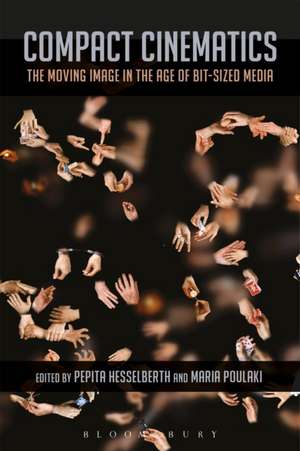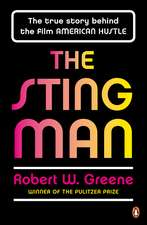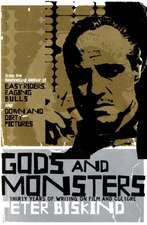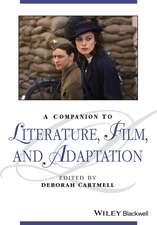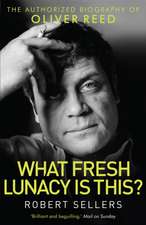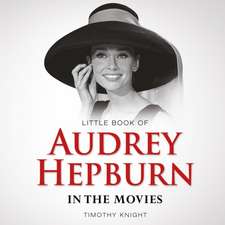Compact Cinematics: The Moving Image in the Age of Bit-Sized Media
Editat de Pepita Hesselberth, Maria Poulakien Limba Engleză Hardback – 25 ian 2017
| Toate formatele și edițiile | Preț | Express |
|---|---|---|
| Paperback (1) | 237.37 lei 43-57 zile | |
| Bloomsbury Publishing – 25 iul 2018 | 237.37 lei 43-57 zile | |
| Hardback (1) | 774.53 lei 43-57 zile | |
| Bloomsbury Publishing – 25 ian 2017 | 774.53 lei 43-57 zile |
Preț: 774.53 lei
Preț vechi: 1113.34 lei
-30% Nou
Puncte Express: 1162
Preț estimativ în valută:
148.20€ • 155.15$ • 122.63£
148.20€ • 155.15$ • 122.63£
Carte tipărită la comandă
Livrare economică 07-21 aprilie
Preluare comenzi: 021 569.72.76
Specificații
ISBN-13: 9781501322266
ISBN-10: 1501322265
Pagini: 256
Ilustrații: 50 bw illus
Dimensiuni: 152 x 229 x 23 mm
Greutate: 0.56 kg
Editura: Bloomsbury Publishing
Colecția Bloomsbury Academic
Locul publicării:New York, United States
ISBN-10: 1501322265
Pagini: 256
Ilustrații: 50 bw illus
Dimensiuni: 152 x 229 x 23 mm
Greutate: 0.56 kg
Editura: Bloomsbury Publishing
Colecția Bloomsbury Academic
Locul publicării:New York, United States
Caracteristici
Introduces the new concept of compactness, and offers a concrete media theoretical, analytical, and archaeological perspective from which to rethink contemporary cinematics and its significance within our present-day media-saturated culture
Notă biografică
Pepita Hesselberth is assistant professor in cultural theory, film, and digital media at the Department of Film and Literary Studies, Leiden University, the Netherlands. She is the author of Cinematic Chronotopes (Bloomsbury, 2014), and the guest editor of Empedocles: Journal of Philosophy of Communication, on "Short Film Experience" (with Carlos Roos; 2015). Currently she is working on her project on Disconnectivity in the Digital Age, for which she received a grant from the Danish Council of Independent Research, and is appointed as a research fellow at the University of Copenhagen. Maria Poulaki is Lecturer in Film and Digital Media Arts at University of Surrey, UK. Placing contemporary cinematics within the realm of complexity theory and neuroscience debates she has contributed to Screen, New Review of Film and Television Studies, Film-Philosophy, Cinema & Cie, Projections, and a number of edited volumes.
Cuprins
Introduction Compact Cinematics: Screen, Capture, Attention // Pepita Hesselberth (Leiden University, The Netherlands) & Maria Poulaki (University of Surrey, UK) Part 1 [Short] Minimal Narratives 1. Countdown to Zero: Compressing Cinema Time // Tom Gunning (The University of Chicago, US) 2. On Conflict in Short Film Storytelling // Richard Raskin (Aarhus University, Denmark) 3. Accelerated Gestures: Play Time in Agnès Varda's Cléo de 5 à 7 // Peter Verstraten (Leiden University, The Netherlands) 4. Lynch on the Run: The Proximity of Trauma in the Short Film // Todd McGowan (The University of Vermont, USA) Part 2 [Condensed] Polyphonic Archives 5. The Ethics of Repair: Re-Animating the Archive // Sean Cubitt (Goldsmiths, University of London, UK) 6. Long Story Short // Natalie Bookchin (Rutgers, USA) 7. Skip Intro? Short Video Intros as a Reflexive Threshold in the Interactive Documentary// Tina M. Bastajian (Webster University the Netherlands, The Netherlands) 8. The Viewser as Curator: The Online Film Festival Platform // Geli Mademli (University of Amsterdam, The Netherlands) Part 3 [Compressed] Pleasure & Productivity 9. The Contingent Spectator // Francesco Casetti (Yale University, USA) 10. Speed Watching, Efficiency, and the New Temporalities of Digital Spectatorship // Neta Alexander (The New York University Tisch School of the Arts, USA) 11. Visual Pleasure and GIFs // Anna McCarthy (The New York University Tisch School of the Arts, USA) 12. Solitary Screens: On the Recurrence and Consumption of Images // Pasi Väliaho (Goldsmiths, University of London, UK) Part 4 [Miniature] Mobile Cinematics 13. Archaeology of Mobile Film: Blink, Bluvend and the Pocket Short // Kim Louise Walden (University of Hertfordshire, UK) 14. Children's Little Thumb Films or "Films-Poucets" // Wanda Strauven (Goethe-Universität Frankfurt, Germany) and Alexandra Schneider (University in Mainz, Germany) 15. Of Flip Books & Funny Animals: Chris Ware's Quimby the Mouse // Yasco Horsman (Leiden University, The Netherlands) 16. Mobile Cinematics // Maria Engberg (Malmö University, Sweden) and Jay David Bolter (Georgia Institute of Technology, USA) Part 5 [Compacted] Urban Ecologies 17. Screening Smart Cities: Managing Data, Views, and Vertigo // Gillian Rose (The Open University, UK) 18. Of Compactness: Life with Media Façade Screens // Ulrik Ekman (University of Copenhagen, Denmark) 19. Codified Space: Cinematic Recodings of Urban Reality // Justin Ascott (Norwich University of the Arts, UK)
Recenzii
[T]he book features excellent articles of interest to scholars working on specific aspects of screen and visual cultures.
[T]he book's attention to the generally neglected ecology of short-form work that is so prevalent today, along with its insistence on a broad historical context that refuses to neglect the past as we examine the present and look to the future, make it vital; (.) the attempts to name and frame a shifting context underscore how complex the changes are.
Compact Cinematics is a rich well of provocative thought on both media and its role in our lives, historically and presently ... A stimulating text and, read in whole, it will not fail to ignite passion for further research in nearly everyone who reads it ... Those interested in the topic at every level would benefit from this text.
A necessary read for media and moving image scholars and practitioners.
Hesselberth and Poulaki have assembled some of the most exciting thinkers in the field, with essays both from emerging and established voices, to rethink the concepts of compactness, fragmentation and the short in visual culture. The result is an extremely rich collection, spanning film, television and digital media studies, and one that offers ways new ways to think through the compression of twenty-first century media.
Compact Cinematics is a bold collection of essays by leading film and media theorists who depart from the notion of object-oriented study, refocusing debate around processes, habits and textures. The range of approaches delivers a fittingly multi-angled view of the current mediascape in which intensity resides in the miniature and the fragment, images are both commanding and adhesive, and human attention is a premium capture.
Compact Cinematics: The Moving Image in the Age of Bit-Sized Media is a stimulating text and, read in whole, it will not fail to ignite passion for further research in nearly everyone who reads it. The text's own exploration of what 'compact cinema' entails, expounded on in seven of the chapters, is enlightening to consider and expands our view of contemporary media.
[T]he book's attention to the generally neglected ecology of short-form work that is so prevalent today, along with its insistence on a broad historical context that refuses to neglect the past as we examine the present and look to the future, make it vital; (.) the attempts to name and frame a shifting context underscore how complex the changes are.
Compact Cinematics is a rich well of provocative thought on both media and its role in our lives, historically and presently ... A stimulating text and, read in whole, it will not fail to ignite passion for further research in nearly everyone who reads it ... Those interested in the topic at every level would benefit from this text.
A necessary read for media and moving image scholars and practitioners.
Hesselberth and Poulaki have assembled some of the most exciting thinkers in the field, with essays both from emerging and established voices, to rethink the concepts of compactness, fragmentation and the short in visual culture. The result is an extremely rich collection, spanning film, television and digital media studies, and one that offers ways new ways to think through the compression of twenty-first century media.
Compact Cinematics is a bold collection of essays by leading film and media theorists who depart from the notion of object-oriented study, refocusing debate around processes, habits and textures. The range of approaches delivers a fittingly multi-angled view of the current mediascape in which intensity resides in the miniature and the fragment, images are both commanding and adhesive, and human attention is a premium capture.
Compact Cinematics: The Moving Image in the Age of Bit-Sized Media is a stimulating text and, read in whole, it will not fail to ignite passion for further research in nearly everyone who reads it. The text's own exploration of what 'compact cinema' entails, expounded on in seven of the chapters, is enlightening to consider and expands our view of contemporary media.
